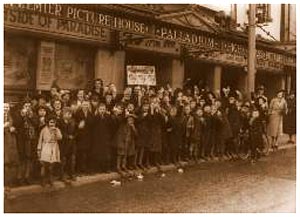
Exeter Stories
Exeter folk and friends in their own words - 1890's to the 1990's │ << Previous story │ Next story >> │
Margaret Ball - Going to the Pictures in the 20's and 30's
In the 1920s and 1930s a visit to the cinema was the most popular entertainment. At one time Exeter boasted seven cinemas. Smaller ones faded out and three were left, the Odeon, the Savoy (ABC) and the Gaumont. There was, of course, no television in those days but most people owned a radio. If you did not want to buy one, you could rent one from Rediffusion for 1/3d (6 pence) per week. This had its advantages. During the war a local announcer would interrupt the programmes with 'the sirens have just sounded the Alert' and later 'the sirens have just sounded the All Clear'. Occasionally a French voice would break saying, "Allo Allo c'ici Radio Toulouse'' and nothing more.
Every Saturday night there was serial which all the family sat down to hear. One popular one was called ''Death on the Range'' and we had to wait until the following week to hear the outcome of the last thrilling episode.
But the 'pictures' were our real enjoyment. Films were so popular that there was often a long queue for the 1/6d seats. In 1942 Margaret Mitchell's ''Gone With The Wind'' swept through the cinemas. Everyone had read the book and everyone wanted to see it. It was a box office sensation, and the book sold in millions. The stars were Clark Gable and Vivien Leigh who both gave memorable performances. The film ran for 3½ hours with 15-minute interval (for those with weak bladders). My current boy friend was, at that time, friendly with the manager of the Savoy, so we had very good seats, centre front row of the balcony. There was usually a News Reel from British Movietone News. For the first time people could see the actual battlefields and the war in France.
Names the come to mind are Edna Best, Ralph Richardson, Sylvia Sidney, Nova Pilbeam, Clive Brook, Spencer Tracy, June Allyson, Dick Powell and Fred MacMurray. On Saturday mornings children went to the King’s Hall in Okehampton Street for children's matinee. Favourites were Charlie Chapman, Felix the Cat, and ''Out of the Inkwell'' series of cartoons. All were in black and white. Colour had not yet reached the cinemas. Films were accompanied by piano. There was always a Pearl White serial with a dramatic ending, which ensured your return the following week.
My cousin took me to see the first-ever talkie. It was ''The Singing Fool" with Al Jolson. Up to that time all films had been silent, with captions at the bottom the screen and a piano playing suitable music. Everyone thought was marvellous to hear the actors speaking. In fact it marked the end of some actor's careers as their voices were not good enough.
I remember going to see “The Great Dictator” a film which made fun of Hitler and was consequently very popular. The boy friend who took me to see the film was soon called into the Royal Air Force and went off to join Colonel Wingate and his Chindits in the far east somewhere, Burma I believe; I never saw him again.
We so admired the glamorous stars of the screen, like Hedy Lamarr, Rita Hayworth, Betty Grable, etc. They were so beautifully dressed, with elaborate hair styles. No jeans and shirts in those days. Universal favourites were Shirley Temple, with her dimples and curls, and Deanna Durbin who had a lovely singing voice. Girls sighed over Gary Cooper, Errol Flynn and Robert Taylor. I always liked a series of B films called the "Jones Family” with Jed Prouty and Spring Byington. It went on for long time. It was a sort of modern ‘Waltons’.
The last film shown at the Gaumont (it closed for a time in 1942 because of bomb damage - editor) was the “Tawny Pipit” The poster stayed on the wall long after the cinema closed. When the Odeon was first opened my father took me to see “The Mikado” (1939 editor) there, my introduction to Gilbert and Sullivan. The Odeon was lucky to survive the war. the houses on the opposite side of the road were flattened. After seeing a film on Saturday night, we walked home with our heads in a cloud and never minded the distance. During the war we walked in pitch darkness . All street lamps and other lights were forbidden in wartime. Buses stopped at 9pm because of the petrol shortage.
There was a fish and chip shop in Holloway street called May's, where we used to buy scallops. These were slices of potato fried in batter. How good they tasted on cold nights! Although it was dark there was no fear of being accosted in those days . There was a different atmosphere, a freedom from fear, unknown today, when old people are afraid to go out after dark.
Those were the golden days of cinema. Hollywood was at its zenith, producing delightful films which lingered in the memory for years.
© 2006 Margaret Ball - David Cornforth
Margaret Ball was born in Exeter in 1922. She lived in Shakespeare Avenue when the Germans bombed Exeter on 4th May 1942. Here she recalls the entertainment available to Exonians from the 1920's to the 1940's, especially cinema.
 Children queuing outside the Palladium, Paris Street, in 1938 Photo courtesy of Keith Saunders
Children queuing outside the Palladium, Paris Street, in 1938 Photo courtesy of Keith Saunders
│ Top of Page │